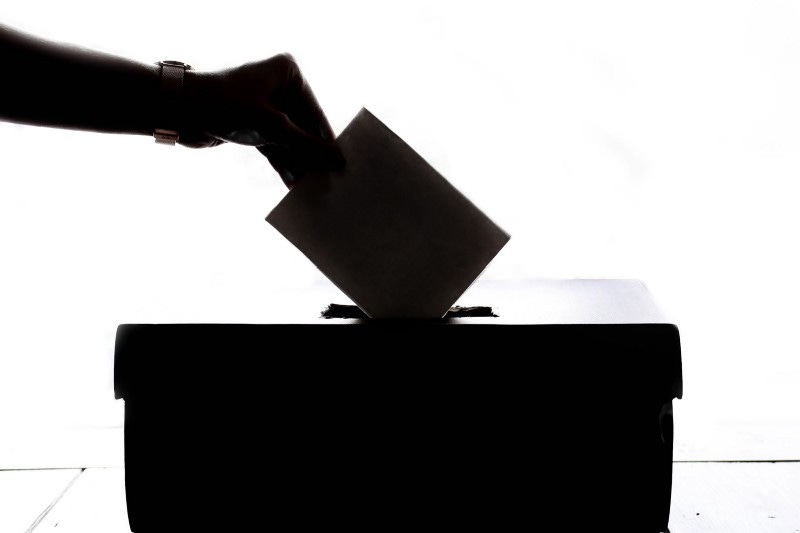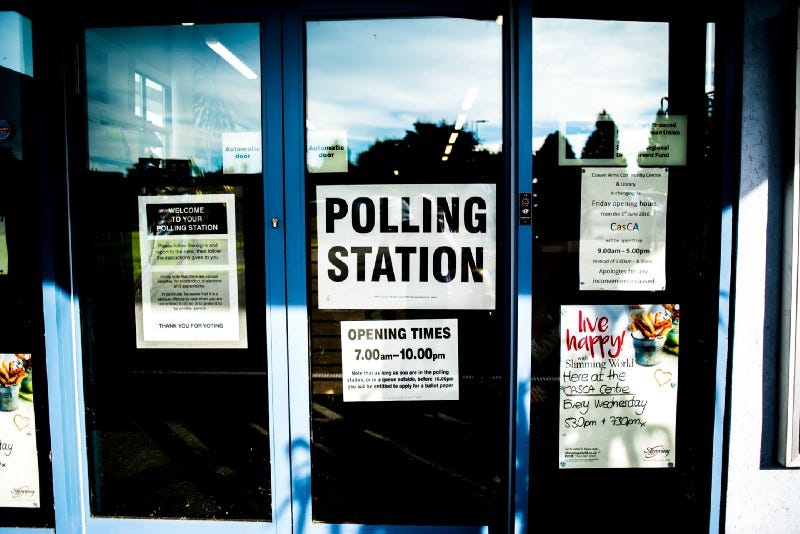Leave Non-Voters Alone
Non-voters aren’t lazy or apathetic, they’re victims of systemic injustice
Non-voters aren’t lazy or apathetic, they’re victims of systemic injustice
We have entered the terminal stage of the 2020 Presidential election.
Now is when the game gets played in earnest. The victim-blaming game, that is. I’m not just talking about victims of sexual assault, who are being betrayed en masse by former #MeToo advocates who have now decided believing women is too politically costly. I’m also talking about blaming the victims of our electoral system, the people so alienated by mainstream, moneyed politics they cannot engage in it, who will nonetheless get blamed for their own exclusion and disenfranchisement.
From here on out, non-voters are going to be relentlessly shamed for being thoughtless, selfish, lazy children. Talk of reforming the electoral college or overturning our oligarchy altogether will be silenced, in favor of mocking young people who have never voted before, and progressives who refuse to endorse a rapist with a track record of supporting mass incarceration. The most marginalized among us will be held responsible for the fundamental injustices of our electoral system.
Non-voters make for an easy punching bag. They’re a silent majority onto which a person can project all kinds of nefarious motives and ignorant points-of-view. People claim that they’re totally apathetic, and yet also too obsessed with political purity to hold their nose and vote for a flawed candidate. Non-voters are seen as both uninformed ignoramuses, and elitist, theory-obsessed communists who don’t live in the real world. They’re lazy conformists, but they’re also single-handedly responsible for the destruction of the country.
None of this makes sense, of course, but it sure feels satisfying to believe. When you’re feeling despondent and powerless, it’s nice to have someone to sanctimoniously punch down at. It’s comforting to believe the root of our political problems is that there’s a large collective of amoral, lazy saps who need to be scolded into taking action. It’s far more horrifying to admit that we are all being manipulated and exploited by a system that undermines Black and brown voters, young people, disabled people, and the poor, and that sometimes people decide giving up on a losing game is the only move that makes sense.
As a social scientist, I am inclined to look at how systems create and perpetrate problems. To me it seems obvious that if millions of people are all choosing to behave the same way within the same context, it is the context that explains the behavior. Refusal to vote isn’t some random moral failure that millions of people are each independently choosing to make for the hell of it. There is clearly a powerful stream of influence flowing from the very top of our political system, making it either both incredibly difficult and pointless for millions of Americans to vote.

The voter turnout rate in the United States usually hovers somewhere around 55%. Compared to the UK’s 69%, Mexico’s 65%, or South Korea’s 77%, our rate sounds pretty dismal. When you list the voter turnout rates of other comparable countries in order, it doesn’t look pretty either: dozens of countries have better voter turnout than the U.S. Americans must be especially lazy and apathetic, right?
Not so fast. When we compare the voter turnout rates of different countries as if they were equivalent, we ignore massive differences in how frequently elections are held, how long campaigns last, and how various states’ laws facilitate or inhibit voting. An election in the UK is not the same thing as an election in the US. And there are a variety of ways in which elections in the United States are basically engineered to be as demotivating and difficult to participate in as possible. Here’s how:
We Have Elections More Often Than Anywhere Else
Did you know the United States has more frequent elections than any other country? It’s true! Most other democratic states only hold major elections every four or five years, with the occasional local election in between. This is in sharp contrast with the U.S., where we have some smattering of primaries, regional elections, state elections, ballot measures, and national elections basically every single year, often multiple times per year.
Because elections are so frequent in the United States, it’s harder for us to take any single electoral event seriously. Get-out-the-vote efforts are relentless, and staying involved and engaged in every single election is prohibitively time consuming.
We Have Super-Long, Super Expensive Campaign Seasons
We also have some of the longest campaign seasons in the world, with Presidential elections lasting about 565 days (for reference, the UK’s campaign season is 139 days, and Mexico’s is 147).
Because our elections are so frequent and our campaigns are so long, many of our elected officials are in a constant state of fundraising and campaigning.
Career politicians have to spend a year or more raising money, organizing rallies, and knocking on voter’s doors. If they lucky enough to win, they may get to spend one, maybe two years doing actual governance before they have to devote themselves to re-election once again.
The signal-to-noise ratio on most elections is therefore woefully low. Politicians spend vastly more time trying to get your vote than they spend doing the things you elected them to do. This further demotivates potential voters, because it makes electing a politician a short-term, shallow victory at best. It’s basically designed to be as unsatisfying a process as possible. Can you blame 45% of Americans for seeing all of this as a loud, confusing waste? I can’t.

We Discourage Turnout
In addition to having more frequent, longer-lasting, less satisfying elections than other countries, the United States also does far less to facilitate voters getting to the polls. In 22 countries, voting is legally mandated, and turnout is consequently very high. Most nations, however, don’t take such an extreme (and flawed) measure; instead, they make election day a national holiday, or hold elections on weekends. These countries typically have more robust legal protections for the employees who do have to leave work to make it to the polls.
We Make Registration as Hard as Possible
Most countries also make the process of registering to vote much easier than it is in the U.S. In Denmark, Sweden, Iceland, Belgium, and Iraq, all eligible voters are automatically registered to vote; when Iraq implemented automatic voter registration in 2014, their turnout sharply increased.
We Make Voters Re-Register Way Too Often
Many countries also handle their registration records far better than the U.S. does. In Canada, for example, you don’t have to update your registration when you move. Requiring voters to re-register to vote every time they change addresses is a policy that actively suppresses turnout for poorer people, because they are more likely to rent property and move often.
We Bar Black People, Poor People, and Latinx People From the Polls
Of course, many electoral laws in the United States are designed to prevent poor people and people of color from voting. Voter ID laws make it more difficult for impoverished people to vote. Shorter registration windows do too. Restrictions placed on early voting and absentee voting also hamper would-be voters (particularly those who can’t leave work to go to the polls), and drive down the turnout rate.

We Fail to Give People of Color and Poor People Worthwhile Options
In April, Glen Greenwald published an article in The Intercept revealing that non-voters are largely marginalized people, not the apathetic, privileged white kids they’re often stereotyped as being. For example, in 2016 half of non-voters were people of color, whereas only a quarter of participating voters were POC. Across many elections, the majority of nonvoters are low-income people of color, and they often feel completely unrepresented by the two-party system and its candidates.
The Privileged, Apathetic Nonvoter is a Myth
People who shame non-voters tend to fall back on the rhetoric that people of color gladly vote for Democrats in droves, and those who don’t vote are simply spoiled white kids who aren’t as willing to put in the necessary “work” of supporting a bad candidate. The relative youth of non-voters is often a major point in this rhetoric; it’s used to imply that refusal to vote is a sign of immaturity, and perhaps idealism, and that people who live in the ‘real world’, with real material concerns eventually grow up and choose to participate in politics.
This data suggests that’s all just a fiction, one that’s used to dismiss the concerns of people alienated by the Democratic and Republican parties. The people who check out of the electoral process are the opposite of privileged. In fact, they’ve been so thoroughly steamrolled by our system that participating in politics is either nearly impossible, or so pointless and unrewarding that they’ve chosen to opt out. Unfortunately, their relative helplessness in this system is mistaken, as it so often is, for laziness.
Shaming Nonvoters Makes Things Worse
If the solution to low voter turnout was shaming and upbraiding people, it would have been solved years ago. But non-voting was never the personal, moral failure that pundits and sanctimonious scolds made it out to be. Instead, it is a massive, systemic problem caused by a variety of features unique to the American electoral system. And systemic problems must be solved with systemic solutions. Attacking victims of a system for doing what is logical within that system is pointless and often downright cruel.
Shaming non-voters gives us a sense of control over a problem we’d otherwise be powerless in the face of. If we pretend non-voting is driven by tons of small, individual people making tons of bad decisions, then we have access to a simple solution: we just have to yell at all of them and make them do the right thing. This belief gives us permission to be self-righteous and outraged at an acceptable target.
The thing is, rage is absolutely warranted —it’s simply been directed it at the wrong source. It may initially feel overwhelming to confront, but the truth is our electoral system is designed at every conceivable level to suppress voter registration and turnout, confuse and overwhelm new voters, demotivate prolonged engagement, and silence the voices of marginalized people. You should be angry about all of that.
Instead of unleashing that anger on the people most victimized by these issues, join with them, recognize that your interests align with theirs, and advocate for fundamental, far-reaching changes to the way voting and governance works in this country. Leave non-voters alone. Confront the people and systems that made them non-voters instead.




